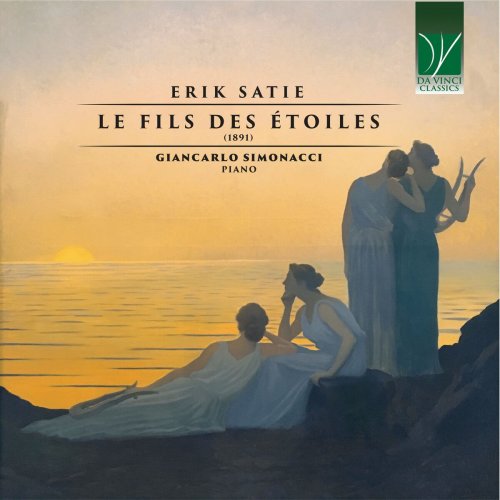
Giancarlo Simonacci - Erik Satie: Le Fils Des Étoiles (1891) (2023)
BAND/ARTIST: Giancarlo Simonacci
- Title: Erik Satie: Le Fils Des Étoiles (1891)
- Year Of Release: 2023
- Label: Da Vinci Classics
- Genre: Classical
- Quality: FLAC (tracks)
- Total Time: 56:38 min
- Total Size: 134 MB
- WebSite: Album Preview
Tracklist:
01. Prélude du 1er Acte - La Vocation, Thème décoratif: La nuit de Kaldée
02. 1er Acte - La Vocation
03. Prélude du 2e Acte - L'initiation , Thème décoratif: La salle basse du Grand Temple
04. 2e Acte - L'Initiation
05. Prélude du 3e Acte - L'Incantation, Thème décoratif: La terrasse du palais du patesi Goudéa
06. 3e Acte - L'Incantation
01. Prélude du 1er Acte - La Vocation, Thème décoratif: La nuit de Kaldée
02. 1er Acte - La Vocation
03. Prélude du 2e Acte - L'initiation , Thème décoratif: La salle basse du Grand Temple
04. 2e Acte - L'Initiation
05. Prélude du 3e Acte - L'Incantation, Thème décoratif: La terrasse du palais du patesi Goudéa
06. 3e Acte - L'Incantation
In December of 1891, at the tender age of 25, Erik Satie penned the incidental music for “Le fils des étoiles,” a poetic drama by Josephin Peladan sharing the same title. During that year and extending into 1892, Satie served as the official composer and chapel master for the esoteric and religious Mystic Order of the Rose + Cross.
This order was established by Peladan, who exhibited a deep appreciation for symbolic art and the music of Richard Wagner. This admiration was so profound that Peladan adorned his own work with the subtitles “Pastorale Kaldéenne” and “Wagnérie Kaldéenne”. The narrative, set in the Chaldean era around 3000 BC, chronicles the journey of a shepherd (the son of the stars) as he joins the Chaldean priesthood, facing both material and spiritual trials.
Interestingly, despite the order’s veneration of Wagner, Satie’s composition displays no Wagnerian influence. In fact, it is decisively non-dramatic, a stark contrast to Wagner’s aesthetic. Satie’s association with the order lasted just over a year, and in August 1892, in a candid letter to the Gil Blas newspaper, he declared: “Good Monsieur Peladan has never impinged upon my aesthetic independence.”
It is well-documented that Satie shared a close friendship with Debussy. In a public lecture on Debussy in 1922, Satie reminisced: “When we first crossed paths, he was profoundly enamoured with Mussorgsky, seeking a musical path that was elusive. It was during this time that I was working on ‘Le fils des étoiles’, inspired by a text by Josephin Peladan. I was emphasizing to Debussy the importance for us French to disentangle ourselves from the Wagnerian narrative, which was discordant with our natural inclinations. I pointedly expressed that while I was not anti-Wagnerian, our music should ideally be free of sauerkraut.”
This order was established by Peladan, who exhibited a deep appreciation for symbolic art and the music of Richard Wagner. This admiration was so profound that Peladan adorned his own work with the subtitles “Pastorale Kaldéenne” and “Wagnérie Kaldéenne”. The narrative, set in the Chaldean era around 3000 BC, chronicles the journey of a shepherd (the son of the stars) as he joins the Chaldean priesthood, facing both material and spiritual trials.
Interestingly, despite the order’s veneration of Wagner, Satie’s composition displays no Wagnerian influence. In fact, it is decisively non-dramatic, a stark contrast to Wagner’s aesthetic. Satie’s association with the order lasted just over a year, and in August 1892, in a candid letter to the Gil Blas newspaper, he declared: “Good Monsieur Peladan has never impinged upon my aesthetic independence.”
It is well-documented that Satie shared a close friendship with Debussy. In a public lecture on Debussy in 1922, Satie reminisced: “When we first crossed paths, he was profoundly enamoured with Mussorgsky, seeking a musical path that was elusive. It was during this time that I was working on ‘Le fils des étoiles’, inspired by a text by Josephin Peladan. I was emphasizing to Debussy the importance for us French to disentangle ourselves from the Wagnerian narrative, which was discordant with our natural inclinations. I pointedly expressed that while I was not anti-Wagnerian, our music should ideally be free of sauerkraut.”
Year 2023 | Classical | FLAC / APE
As a ISRA.CLOUD's PREMIUM member you will have the following benefits:
- Unlimited high speed downloads
- Download directly without waiting time
- Unlimited parallel downloads
- Support for download accelerators
- No advertising
- Resume broken downloads


